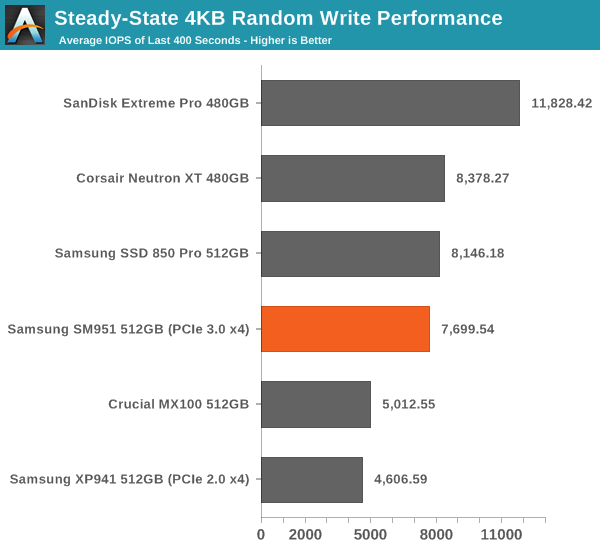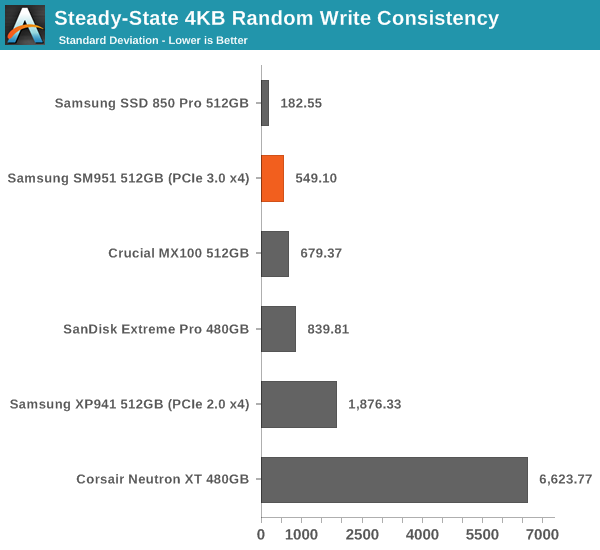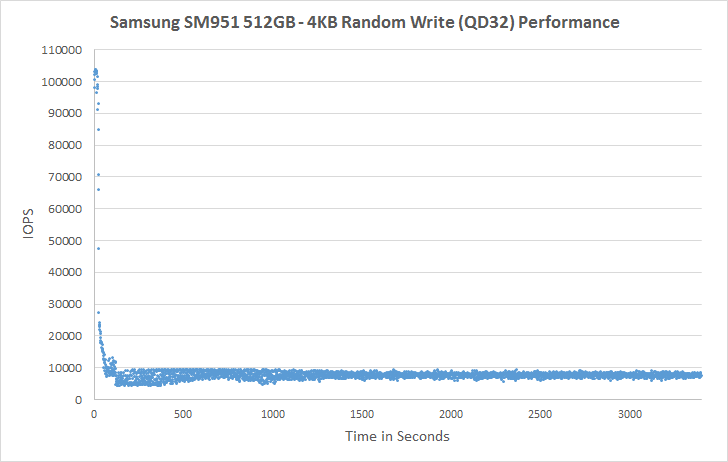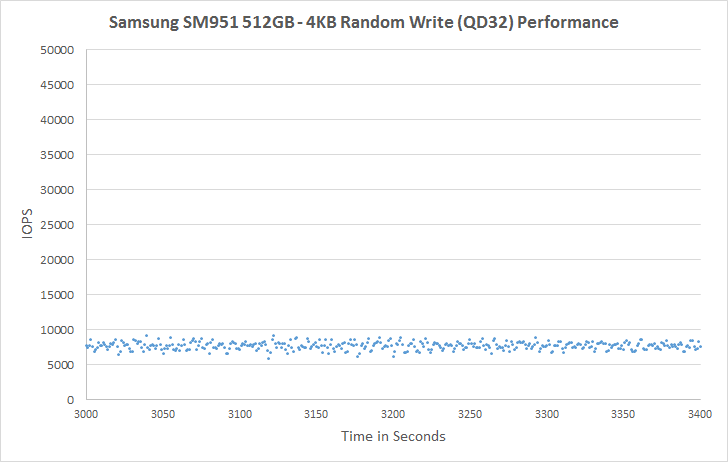Samsung SM951 (512GB) PCIe SSD Review
by Kristian Vättö on February 24, 2015 8:00 AM ESTPerformance Consistency
We've been looking at performance consistency since the Intel SSD DC S3700 review in late 2012 and it has become one of the cornerstones of our SSD reviews. Back in the days many SSD vendors were only focusing on high peak performance, which unfortunately came at the cost of sustained performance. In other words, the drives would push high IOPS in certain synthetic scenarios to provide nice marketing numbers, but as soon as you pushed the drive for more than a few minutes you could easily run into hiccups caused by poor performance consistency.
Once we started exploring IO consistency, nearly all SSD manufacturers made a move to improve consistency and for the 2015 suite, I haven't made any significant changes to the methodology we use to test IO consistency. The biggest change is the move from VDBench to Iometer 1.1.0 as the benchmarking software and I've also extended the test from 2000 seconds to a full hour to ensure that all drives hit steady-state during the test.
For better readability, I now provide bar graphs with the first one being an average IOPS of the last 400 seconds and the second graph displaying the standard deviation during the same period. Average IOPS provides a quick look into overall performance, but it can easily hide bad consistency, so looking at standard deviation is necessary for a complete look into consistency.
I'm still providing the same scatter graphs too, of course. However, I decided to dump the logarithmic graphs and go linear-only since logarithmic graphs aren't as accurate and can be hard to interpret for those who aren't familiar with them. I provide two graphs: one that includes the whole duration of the test and another that focuses on the last 400 seconds of the test to get a better scope into steady-state performance.

In steady-state performance the SM951 provides a substantial ~70% upgrade over the XP941 and brings performance nearly to the same level with the 850 Pro. Given that the 850 Pro uses faster V-NAND, the steady-state performance is a pleasant surprise and shows that the SM951 is more than a marginal bump from the XP941. Obviously, drives with more default over-provisioning (i.e. Extreme Pro and Neutron XT) provide higher steady-state performance, but Samsung is doing very well with the default 7% over-provisioning.

The consistency of the SM951 is also great. The Neutron XT is a living proof of a drive with high average IOPS, but horrible consistency because as we can see in the graph above its standard deviation is up to dozens of times higher compared to the other drives. That's just not acceptable for a modern drive, especially because there are many drives that can consistently provide high IOPS.
 |
|||||||||
| Default | |||||||||
| 25% Over-Provisioning | |||||||||
For a dozen seconds or so, the SM951 is actually able to burst out 100K IOPS, but the performance soon drops to below 10K IOPS and eventually evens out at ~7.5K IOPS. The SM951 is very consistent and doesn't experience any notable IOPS drops, whereas the XP941 regularly drops to a few hundred IOs per second. Increasing the over-provisioning to 25% brings the IOPS to about 35K, which is very decent and again much better than the XP941 that still has odd drops in performance.
 |
|||||||||
| Default | |||||||||
| 25% Over-Provisioning | |||||||||










128 Comments
View All Comments
3DoubleD - Tuesday, February 24, 2015 - link
While this drive looks great and all, after all the problems the 840EVO has had, it is hard to get excited about big benchmark numbers from a Samsung drive... you never know if they will stay that way. That said, this drive is MLC and not TLC, so less chance of similar issues as the 840EVO. Still, Samsung has a lot of work to repair their reputation with their customers.theduckofdeath - Tuesday, February 24, 2015 - link
Yeah, they only have a bit more than 1/4 of the market. Really suffering from that snafu... I think you're overreacting just a bit... :)3DoubleD - Tuesday, February 24, 2015 - link
How could their past sales possibly have suffered from a problem that is ongoing and developing? How future customers react will depend on whether Samsung properly addresses the current issues. My comment is based on this fact.theduckofdeath - Tuesday, February 24, 2015 - link
I have an Evo 840 and since the performance restoration fix I have not seen any sign of performance degradation on my drive. And that fix was made in October last year.theduckofdeath - Tuesday, February 24, 2015 - link
And just to clarify hwo desperate your trolling attempts are. It took (a limited number of) users a year to realise there even could be issues. That's how rare and hard to notice it was, even though the Evo 840 is probably the most sold SSD ever.K_Space - Tuesday, February 24, 2015 - link
I am not sure if you are aware, however Samsung has released a recent statement to the effect that there remain issues with the 840 EVO drive and the above fix has not provided a permenant resolution:http://www.anandtech.com/show/8997/samsung-release...
I have an XP941 and SD Extreme Pro 480; it'd sensible to see how Samsung deals with the current situation at hand which may tip me and other enthusiasts (? <5% of their SSD sales) one way or the other.
extide - Tuesday, February 24, 2015 - link
Not really, Samsung has many other great drives, even older ones that are/were still great like the 830, 840 pro, etc. Couple teething issues on early TLC drives, thats pretty much what to expect ion this industry. The MAIN thing is that they are infact handling it, and not just shuffling it under the rug. IMHO thats far more important than anything else.smilingcrow - Wednesday, February 25, 2015 - link
"The MAIN thing is that they are in fact handling it"The MAIN thing for me is when they have HANDLED it and the solution sticks over time as only then would I trust one of their TLC drives again.
If that fails I expect a product recall which they haven't offered on the vanilla 840 yet which seemingly still has no fix. No recall = NOT handling it.
3DoubleD - Wednesday, February 25, 2015 - link
Teething issues - OK, that's fine, as long as they fix them, and that's all I've been saying; however, the verdict is still out as to whether they have fixed them or not, and that was my initial point.The minute they apply a permanent firmware fix or, if a firmware fix is not possible, a recall, then they will have handled it and I'd feel future Samsung purchases were justified. This obviously applies most strongly for Samsung TLC products, but how Samsung responds to SSD issues in general should be of interest of any current and potential Samsung SSD owner (TLC or MLC).
cm2187 - Tuesday, February 24, 2015 - link
What problems are you referring to?